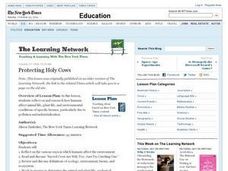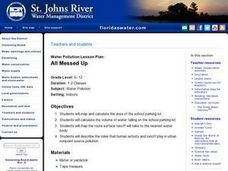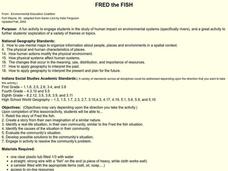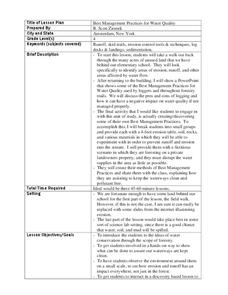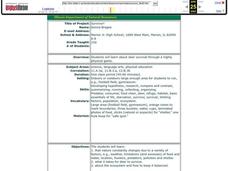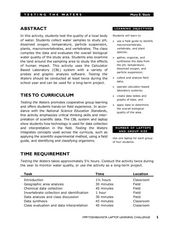Curated OER
The Environment and You
First graders examine the human environmental impact and discover ways to lessen effects. They create a pollution damage flow chart and write down what they think Mother Earth might say. They create inventions from recyclable materials.
Curated OER
Rubber Duckies and Ocean Currents
Students explore marine life by conducting a rubber duck experiment. In this water currents lesson plan, students practice identifying latitude and longitude coordinates on a map and define the currents of major oceans. Students discuss...
Curated OER
Microbes in Long Island Sound
Students discover the harm and benefits of microbes. In this biology lesson, students explore water, nitrogen and carbon cycles. They investigate the factors affecting bacteria growth.
Curated OER
Stream Table
Students explore channelization, riparian habitats and soil erosion to find out about the aquatic habitats in Iowa. In this aquatic habitats lesson, students define important terms and read an article about pollution. Students complete...
Curated OER
Introduction to Restoration Lesson
Middle schoolers explore how pollution and invasive plants disrupt the ecosystem. In this restoration lesson plan students list materials that pollute wetlands, how people can keep them clean and ways in which invasive plants establish.
Curated OER
Protecting Holy Cows
Students study the interrelationships of organisms and their environments. They study ecological communities and determine what is necessary for survival. Students discuss and answer questions concerning a group's biome, habitat, food...
Curated OER
Clouds
Students explore clouds. In this weather lesson, students identify the steps in the water cycle, define condensation and evaporation, and relate this information to cloud formation. Students perform a cloud experiment, predict weather...
Curated OER
Wetland in a Pan
Seventh graders build a watershed from various materials. In this life science lesson plan, the students will be able to change the design of their watershed to see the changes in the way the water will drain. Each group will be able to...
Curated OER
Don't Trust Your Eyes
Pupils brainstorm a list of possible actions that they could do to protect the water resources from pollution. They create hypotheses and conclusions by completing experiments and observing different pollutants.
Curated OER
Water Quality and Temperature
Students are led through three activities to explore the effect of temperature fluctuations on the growth and survival of aquatic plants, clams, and shrimp eggs.
Curated OER
All Messed Up
Young scholars begin the experiment by mapping and calculating their school parking lot. They calculate the volume of water falling on the lot and map the route the water runoff takes. They discuss the roles that humans play in affecting...
Curated OER
Remove Pollutants from Water
Students examine how to remove pollutants from water to create clean water. In this boiling water lesson students complete a lab activity that purifies water.
Curated OER
Underground Pollution
Fourth graders construct their own aquifer. They discover how water travels underwater and identifies sources of underground pollution. They record their observations and discuss the results.
Curated OER
Snow vs. Water
Students fill three cups with snow. They record the height of snow in each cup, and allow the snow to melt. Students measure the height of the water in each glass or cup, and record their results on the worksheet. They answer questions...
Curated OER
FRED the FISH
Young scholars engage in the study of the human impact on environmental systems (specifically rivers). This instructional activity enhances Students' exploration of a variety of themes or topics.
Curated OER
Best Management Practices for Water Quality
Fourth graders examine best management practices for water quality. In this water quality instructional activity, 4th graders explore unused land to identify areas of runoff, erosion, and effects of water flow. Students discuss logging...
Teach Engineering
The Great Pacific Garbage Patch
The Great Pacific Garbage Patch is one of several garbage patches around the world where garbage accumulates naturally. As part of a GIS unit that combines oceanography, environmental science, and life science, class members investigate...
Chymist
How Do We Affect the Quality of Our Atmosphere
Explore the makeup of the earth's atmosphere. Using the set of specific experiments, pupils examine the main elements and compounds present in the atmosphere. Their study extends to investigate the effects of atmospheric pollution such...
Curated OER
Water: P.O.V's Borders Picture Project
Through the use of digital cameras, this lesson shows students how to document how water is used in their local communities and explore how those uses impact the local environment.
Curated OER
Survivor!
Students play a game in physical education class to examine how a deer survives. Using nature as a guide, they discover how it is constantly changing due to weather, food, water, pollution and predators. They discuss the characteristics...
Curated OER
Local Environmental Issues: Pollution
Third graders discuss the ways in which human interaction with the environment and production of waste products contribute to pollution. Through a pollution demonstration, they explain how various groups of plants and animals can be...
Curated OER
The Water Dilemma
Students read about and discuss the importance of easily available, clean drinking water. They participate in a role play scenario in which only one drinking fountain in the school has potable water.
Curated OER
Testing the Waters
Students explore water in depth through discussion, research, and experiment. Students apply map skills to locating particular regions of the world as they relate to water. Students predict water quality based on information researched...
Curated OER
Analyze the Results
Students conduct water tests and sample macroinvertebrates from a nearby source to make a general determination about the overall quality of water. They use worksheets and analyze data as part of a larger unit.







